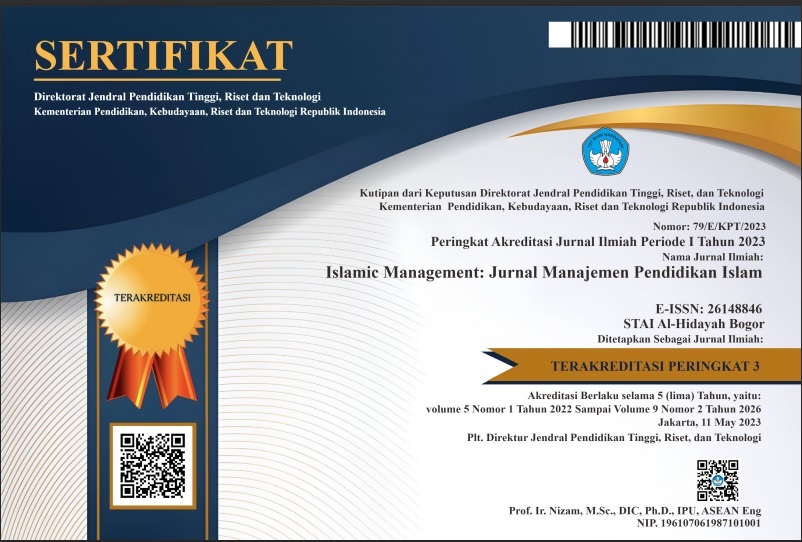INTEGRATION OF ISLAMIC CHARACTER EDUCATION IN MERDEKA BELAJAR CURRICULUM
DOI:
https://doi.org/10.30868/im.v8i01.7787Keywords:
Character education, independent learning curriculum, EducatorsAbstract
Islamic character education is an effort to build a generation that has noble morals based on Islamic values. The Merdeka Belajar Curriculum initiated by the Indonesian government provides flexibility for educators to integrate local values, including religious values, into learning. This article aims to analyze how Islamic character education can be integrated in the Merdeka Belajar Curriculum. This research uses a qualitative descriptive approach through literature review. The results show that the integration of Islamic character education requires collaboration between educators, curriculum, and society in supporting the creation of religious, ethical, and accomplished students. In conclusion, Islamic character education is a key element in building holistic education according to the demands of the modern era.
References
Anwar, S. (2020). Pendidikan Karakter Berbasis Nilai Islami. Jakarta: PT Bumi Aksara.
Hidayat, A. (2019). Membangun Generasi Berkarakter Islami Melalui Pendidikan. Bandung: Alfabeta.
Kemendikbud. (2022). Panduan Implementasi Kurikulum Merdeka Belajar. Jakarta: Kementerian Pendidikan, Kebudayaan, Riset, dan Teknologi.
Mulyasa, E. (2021). Pengembangan Kurikulum di Era Merdeka Belajar. Jakarta: Raja Grafindo Persada.
Yusuf, M. (2023). "Integrasi Nilai-Nilai Islami dalam Pendidikan Formal di Indonesia". Jurnal Pendidikan Islam, 12(1), 45-62.
Zuhdi, M. (2018). "Pendidikan Karakter dalam Perspektif Islam". Jurnal Pendidikan dan Kebudayaan Islam, 6(2), 1-14.
Downloads
Published
How to Cite
Issue
Section
Citation Check
License
Copyright (c) 2025 Bahrul Amiq, Abd. Muhith, Masud Masud, Agus Zainudin

This work is licensed under a Creative Commons Attribution-ShareAlike 4.0 International License.
Authors who publish with this journal agree to the following terms:
- Authors retain copyright and grant the journal right of first publication with the work simultaneously licensed under a Creative Commons Attribution License that allows others to share the work with an acknowledgment of the work's authorship and initial publication in this journal.
- Authors are able to enter into separate, additional contractual arrangements for the non-exclusive distribution of the journal's published version of the work (e.g., post it to an institutional repository or publish it in a book), with an acknowledgment of its initial publication in this journal.
- Authors are permitted and encouraged to post their work online (e.g., in institutional repositories or on their website) prior to and during the submission process, as it can lead to productive exchanges, as well as earlier and greater citation of published work (See The Effect of Open Access).






